

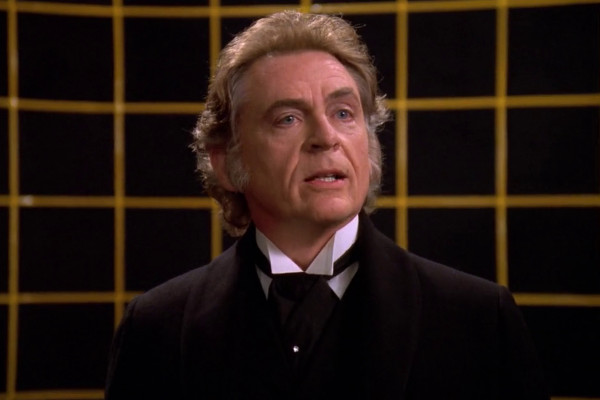
Although the episodic nature of The Next Generation makes it sometimes hard to get immersed in the series, it does reward in that you can comfortably watch episodes at random without having too much difficulty understanding the vague backstory. Ship In A Bottle is a rare episode that uses continuity, acting as the sequel to the fine season two episode Elementary, Dear Data. There, Geordi mistakenly asks the Holodeck to create a villain capable of beating Data, causing a program's Professor Moriarty to develop sentience and a developed awareness.
Such a plot device doesn't actually make a great deal of sense when you consider that Moriarty was able to see the Holodeck arch even before he was upgraded by the ship's computer, but the engaging performance of Daniel Davis as Moriarty keeps things interesting. Sporting a decent English accent, the Arkansas actor has great presence in this sequel story, a narrative that contains a couple of nice twists.

Possibly the most lovable character on the Enterprise (apart from the first season where he was, frankly, kind of a dick) it's always nice to see something good happening in Picard's life. That "something good" here is the presence of a new stellar cartographer on board the Enterprise, who enters his quarters and asks if she can blow his flute. After Picard shows her his instrument, she gets gets out an alien keyboard and starts playing a duet with him, illustrating that playing with her is a lot better than playing with himself.
With Picard loved-up, naturally it doesn't go according to plan and the stellar cartographer has to leave the ship at the end, but not before she makes Picard promise to never give up his music. Picard is forlorn... he knows that he once again has to get used to being in his quarters by himself, playing with his pipe. This episode summary was sponsored by the Carry On film franchise.
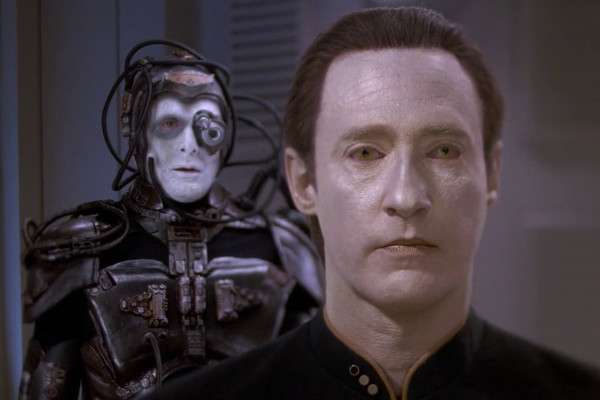
Essentially fan fiction as Data's evil twin Lore comes back to lead an army of Borg, yet it's good fan fiction. The series rarely did action terribly well, and it's clear that it's not Spiner but a stunt double in a lot of the action in a Borg attack. However, things get intriguing when Data reveals he felt pleasure in committing murder.
There is some padding and extended dialogue sequences to make this fit a two-part format - the story was concluded at the beginning of season seven - but it contains enough intrigue to keep things diverting all the way through.
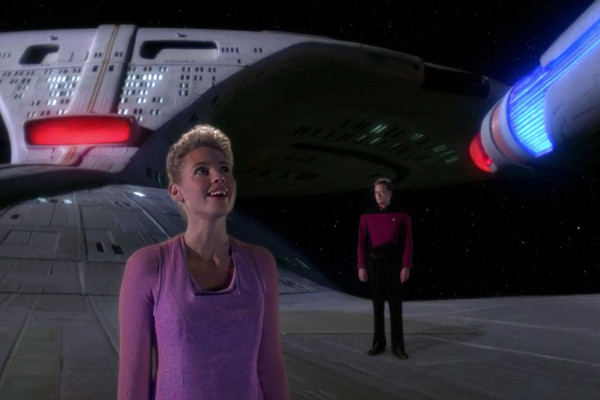
Q is a slightly odd fit with the TNG crew, whereby a science-based trek through space gets periodically interrupted by an omnipotent being with God-like, almost fantasy powers. However, what makes it work is that John De Lancie is very personable in the role and his chemistry with the rest of the cast is off the scale. In particular, there's a certain staid complacency with the crew, a pomposity that Q helps to prick on numerous occasions. His dislike of Riker sees him call the First Officer "No.2", while he says of Beverly Crusher that she "gets more shrill with each passing year."
What makes this particular episode rate so highly is that there's a nastier, more sinister side to the character. When a latent Q boards the Enterprise, Q lets Picard know that not only will he take her into the Q Continuum whether he likes it or not, but if she refuses to go, he'll kill her. The character can be comedic at times, and some of the earlier, broader episodes can be hard to take, but this level of menace and the helplessness of the Enterprise crew adds a dramatic element that's not always present in the programme.
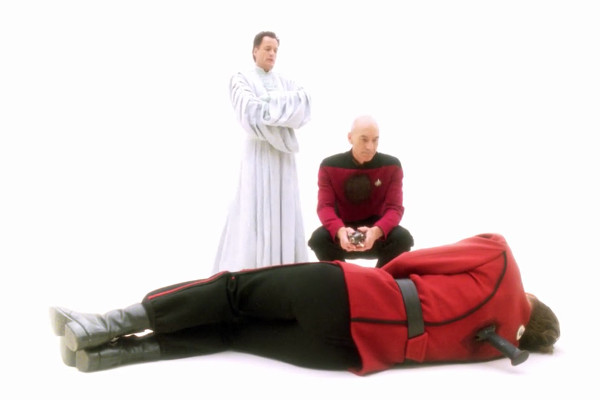
An inconsistent, muddled story that sees Q return, giving a near-death Captain Picard a chance to quantum leap back into his past and change his future, with a touch of It's A Wonderful Life thrown in. The central subject matter - Picard was in a violent bar brawl as a younger man where he got almost fatally stabbed - is a curious one that never seems to sit quite right, particularly as we get a scene where a female in Picard's company is also beaten up by the aliens.
Yet perhaps the most contentious element is that the female in question (J. C. Brandy as Marta) gets to have a passionate kiss and off-screen sex with Picard. Although Picard is in his own body as a 21-year-old, his mind is still that of the much older man. Patrick Stewart was around 52 when the episode was filmed, though the role of Picard is even older, around 63-64 when this episode aired, and while Marta is 21, the actress was 17 when it was filmed. Consequently you've got a 64-year-old character making love to a 17-year-old, an age difference that surely even Woody Allen would baulk at.
So, there are many awkward and uncomfortable moments, and the inspiration behind the story doesn't feel particularly fresh. However, there are still many good, thoughtful moments that make it rate so highly in this ranking, one that gets to further the obvious chemistry between Stewart and De Lancie.
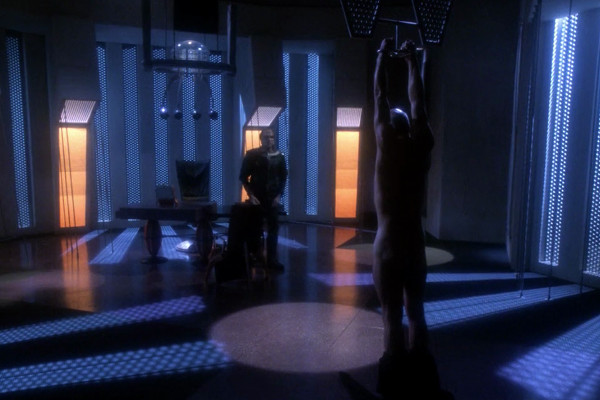
A rare, arguably unique example of a two-part Next Generation story where the second part is actually better than the first. While it's perhaps an unkind exaggeration to suggest that Patrick Stewart often carried the show, this particular entry is based around him using his gifts to the full, playing the Captain tortured by Cardassians. There is a certain level of artifice to the whole thing, almost as if the torture scene was written first, then a story based around it. The idea that the Cardassians would plant a ruse and then logically expect Picard to be the one to investigate it on an espionage mission is incredibly unlikely, but such matters can be disregarded when the story gives us, for once, some drama in the series.
In hindsight, it's strange to see the Cardassians in TNG. Although they were created for the series (in season four's The Wounded) and made half a dozen return appearances, they became so synonymous with Deep Space Nine, appearing in over a quarter of the episodes. Perhaps even stranger is having David Warner as the lead interrogator... although a certain suspension of disbelief is required when accepting that all TNG's aliens talk with American accents, when they bring in an alien with another Earth accent it threatens to bring the whole thing down. (A problem also featured this season with Face of the Enemy and The Chase). However, in watching Chain of Command, we're also having to accept that the lead character is a Frenchman with an English accent, so the matter of disbelief is already in hand. Not only that, but Warner gives a terrific, unforgettable performance, engaging in a psychological duel with Picard throughout his torture. After being released, Picard acknowledges that, although he appears to win the battle of wills, he had actually cracked under the strain... it's a dark ending, and the series may have been more rewarding if it had dared to go this far more often.